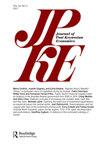主流正统经济学中的明显微观现实主义
IF 1
3区 经济学
Q4 ECONOMICS
引用次数: 0
摘要
摘要正如长期以来所重申的那样,主流经济学主要依赖于一套不切实际的公理和演绎假设,尽管如此,这些都是其核心假设的基础。它们是不必要的不切实际的假设,主要是因为对比它们的经验证据与以往一样压倒性。即使是经济学中关于(回归)现实主义的主张,在经济学界也已经过时了。然而,大多数主流学者倾向于认为,他们的研究工作实际上具有实证内容,因为他们通常从简单的案例、情况或描述开始,这些案例、情况和描述暗示了一些真实的经济方面;这是以将特殊性引入标准的一般均衡模型的方式实现的。本文讨论了这种看似悖论的现象,因此,认为主流正统经济学(现代新古典主义的“经济理论”加上“计量经济学”)中确实存在一种研究计划的主导地位,这种研究计划的主要特征不仅仅是微观经验的精确性,而是一种抽象的微观经验主义。还有人认为,这种“研究生产模式”(贡献)带来的结果似乎与我们提供的关于经济运行和问题的知识量无关。本文章由计算机程序翻译,如有差异,请以英文原文为准。
Apparent micro-realism in mainstream orthodox economics
Abstract As reiterated for a long, mainstream economics mainly relies upon a set of unrealistic axioms and deductive assumptions, which, nevertheless, are what underpins its core postulates. They are unnecessarily unrealistic assumptions, mainly because the empirical evidence for contrasting them is as overwhelming as old. Even the claim for (returning to) realism in economics is already old within part of the profession. However, most mainstream academics tend to consider that their research works have in fact empirical contents insofar as they usually start by considering simplified cases, situations, or descriptions that allude to some real economic facet; this, in the way of specificities to be introduced into the standard General Equilibrium model. This seeming paradox is discussed in this paper, and as a result, it is argued that there do is a predominance of a research programme in mainstream orthodox economics (modern neoclassical “economic theory,” plus “econometrics”) that is mainly characterized, more than by micro-empirical precisions, by a sort of abstract micro empiricism. It is also argued that the outcomes brought about by such a “mode of research production” (contributions) do not appear significantly relevant in terms of the quantum of knowledge provided about the functioning and problems of our economies.
求助全文
通过发布文献求助,成功后即可免费获取论文全文。
去求助
来源期刊

Journal of Post Keynesian Economics
ECONOMICS-
CiteScore
1.70
自引率
10.00%
发文量
23
期刊介绍:
The Journal of Post Keynesian Economics is a scholarly journal of innovative theoretical and empirical work that sheds fresh light on contemporary economic problems. It is committed to the principle that cumulative development of economic theory is only possible when the theory is continuously subjected to scrutiny in terms of its ability both to explain the real world and to provide a reliable guide to public policy.
 求助内容:
求助内容: 应助结果提醒方式:
应助结果提醒方式:


